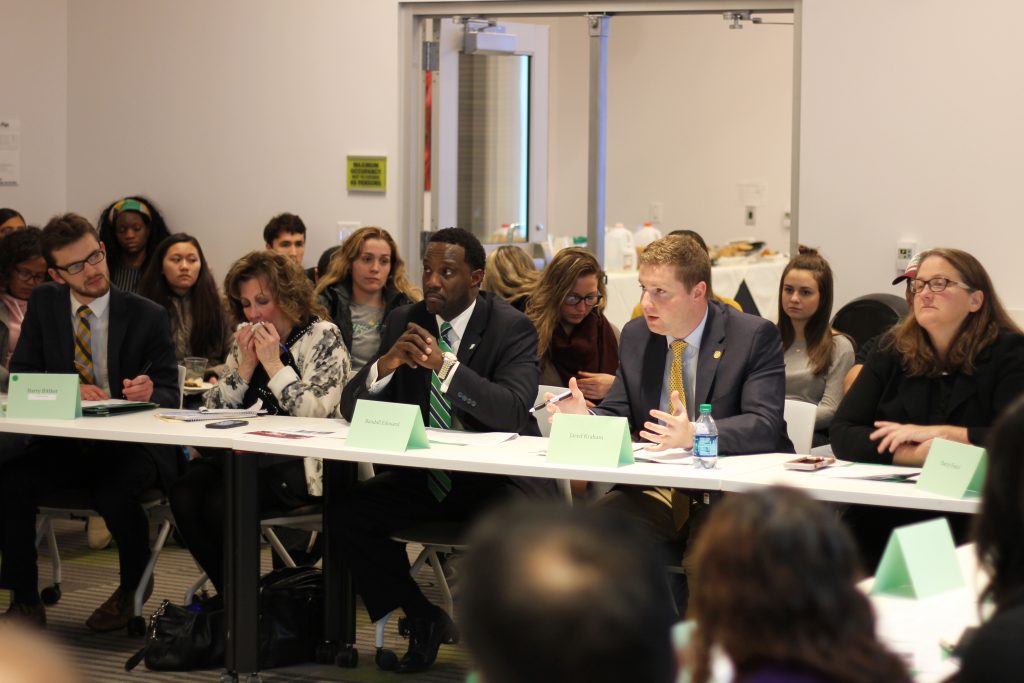Inspired by their sense of responsibility to the city of Binghamton and the Binghamton University campus, city officials, community members, professors and students gathered together on Oct. 24 in the Koffman Southern Tier Incubator for the first Town-Gown Advisory Board (TGAB) meeting of the year.
The board, consisting of 34 committee members representing both the University and the city, aims to utilize its active subcommittees to address issues affecting both groups. Over the summer, the board proposed seven initiatives to better the community, five of which were approved for funding and were given the green light.
Randall Edouard, co-chair of TGAB, interim dean of students and assistant vice president for student affairs, opened the meeting by explaining the purpose and importance of the board.
“Our purpose is to meet, come up with ideas and work together with the community in terms of where does the community intersect with the University,” Edouard said. “That’s why we have so many different people — students, faculty, community members — everything we deal with is about where we intersect. We have great conversations during the subcommittee meetings. We focus on Binghamton and we focus on the city, that is our purpose.”
The board’s proposals for the 2018-19 academic year vary in themes. The Cry, Laugh, Create program will pair BU students and Binghamton residents in sharing their personal stories and visions to build relationships between campus and community. Additionally, a code enforcement proposal was approved to train seven BU interns on relevant housing and leasing issues that will better inform and assist students on campus who are looking for safe off-campus housing.
Other proposals will focus on collecting data. The North Side transportation proposal will survey residents on Binghamton’s North Side on their use of transportation services to assess issues and devise a strategy to optimize accessibility for students and residents alike. The board proposed an initiative that will fund a public safety consultant and transportation expert to come to Binghamton and provide recommendations to improve off-campus safety. The TGAB also chose to implement a data-driven collaboration proposal to connect the University with the Binghamton Campus Community Coalition (BCCC) to address problems with students’ dangerous drinking practices.
Jared Kraham, co-chair of TGAB and deputy mayor of Binghamton, said the board works via a bottom-up approach, where the subcommittees meet and decide on the proposals themselves before presenting them to the executive board. Because of this, the co-chairs rarely interject themselves into the subcommittees’ decisions until the end of the year, when the board discusses determining the most feasible initiatives for funding.
“Our most excellent ideas come from the experts [on the board],” Kraham said. “We have a lot of high-level expertise from the city of Binghamton and the University. It shows to the campus and the community that we take this very seriously.”
According to Kraham, the subcommittees are now tasked with deciding between furthering their assessment and revising the current proposals or starting the planning process for new proposals for next year. The current initiatives will be put into action as soon as the board has direct access to the funds, which are provided mostly by the University. The city aids the board through use of its resources, including city employees.
Along with the members of the board, the meeting was attended by nearly 30 students from HDEV 300: Social Science Research Methods, a class instructed by Mohammed Rabiu Abubakari, a representative of the Graduate Student Organization for the TGAB and a fifth-year graduate student studying interdisciplinary science. Abubakari thought it would be beneficial for his students to learn firsthand what it’s like to get involved and make their voices heard in the community. Naomi Chen, a junior majoring in human development, spoke up to address her concerns regarding safety off campus, and her appreciation of the code enforcement initiative.
“I’ve had all these ideas and concerns and I never knew where to go, but now I want to be a part of [the TGAB],” Chen said. “I’m very annoyed and I want to make students more aware — students are usually very in their own world, but it’s like, ‘You live here, why aren’t you doing something?’ I feel like I have to help — it’s what I love to do, so I think I’ll try to come to [the next TGAB public meeting], too.”



